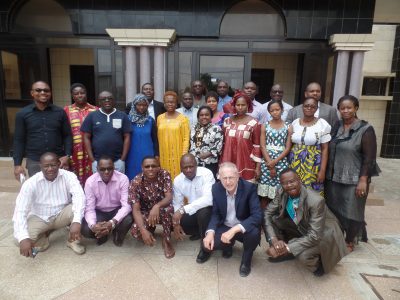Hereby the report (rapport) of the 55th PBF course organised by BEST-SD Benin, BASP-96 Burkina and SINA Health from the Netherlands took place in Cotonou from August 8 to 20, 2016. Dr Séverin SOKEGBE of the Benin PBF program has assisted us also with the facilitation.
There were 21 participants from Mali (10x), Gabon (6x), Ivory coast (2x) and 1 participant from Benin, DRC and Cameroun. We are happy to announce that four participants obtained distinctions.
This 4th course in 2016 also showed the depths of PBF with an ever growing number of experiences, new modules and updated tools such as for the CDV agencies and regulatory authorities. We also for the first time presented the experience of PBF in tertiary hospitals. The course book contains 215 pages and will further grow with each new course to include all the latest developments.
The course evaluation by the participants was positive but 57% also believed that the course was too short. This requires us to refine the methodology for future courses and tailor it towards the course objectives of each participant.
MALI
It is in the context of the Strengthening of Reproductive Health Project of the World Bank (WB-PRSR) that a team participated in the PBF course in Cotonou. The PBF pilot is planned for the Koulikoro region.
The feasibility score (performed by participants during the course) for PBF pilot is 42%. This low feasibility score means that the design of the project should improve for it to have a larger chance of becoming successful. However, a further delay of the start of the pilot project is unhelpful and may even postpone the project. It is therefore recommended to start as fast as possible also if there are still imperfections. Yet the planning for improvements in the short term should already begin.
RECOMMENDATIONS MALI
- Conduct advocacy among the decision makers on the merits of PBF. It should target the Minister of Health and Public Hygiene, the Minister of Economy and Finance as well as the development partners;
- Establish a National Steering Committee and a National Technical PBF Unit;
- Include Hospitals in the PBF approach;
- Increase the number of indicators from 16 to 25 in accordance with standard PBF practice;
- Reallocate the balance of the PRSR / IDA / BM program budget towards the PBF component
- Contact the Minister of Economy and Finance to advocate to allocate a part of the Malian government budget to finance PBF;
- Conduct a baseline study in the Koulikoro region.
GABON
The country has 1.8 million inhabitants. Non-communicable diseases (NCDs) are a growing concern. The government with the team of the World Bank has worked to develop a reform approach and development policy measures for the first and second year of operation and to launch a pilot program PBF. The feasibility score according to 19 PBF criteria is 80%. This means that starting a PBF program is possible. However, the analysis also shows that some areas for improvement as desirable.
RECOMMENDATIONS
- Allow health facilities in the PBF pilot area to procure freely their inputs from accredited distributors.
- Conduct a mapping of public and private health facilities and rationalise the health catchment areas at primary level in units of about 8000 to 12,000 inhabitants;
- Introduce the department- and health facility vulnerability bonus;
- Redefine the criteria for the vulnerable;
- Develop a system of health insurance both for the formal and informal sectors;
- Appoint and post medical doctors as the heads of departments in 10 health departments;
- Conduct a PBF course in Gabon organised by the Ministry of Health and supported by the World Bank in October 2016. There will be 35 participants who will be selected based on the problem analysis of the health system and who are important for the start of the PBF pilot.
- A feasibility study for the PBF pilot will start in November after the PBF course. The feasibility study should be completed by March 2017. We recommend that this team is already present during the October PBF course.
CAMEROON
 The population in 2016 is estimated at 22.8 million inhabitants. Cameroon is low middle-income country with a GDP per person per year of $ 1360. Maternal mortality is high with 596 per 100,000 live births and HIV prevalence is 4%. 14% of the population is covered by the PBF but scaling up is underway in the three northern regions.
The population in 2016 is estimated at 22.8 million inhabitants. Cameroon is low middle-income country with a GDP per person per year of $ 1360. Maternal mortality is high with 596 per 100,000 live births and HIV prevalence is 4%. 14% of the population is covered by the PBF but scaling up is underway in the three northern regions.
RECOMMENDATIONS
- Improve the timeliness of payments of the PBF subsidies;
- Explain the importance of autonomous health facility management to private partners such as church and plantation authorities;
- Advocate for regulatory changes, including to exempt PBF hospitals sending their cost recovery revenues first to the treasury but instead use it directly at the point of collection;
- Change the counter-verification mechanism so that the scores conducted by the health regional authorities should influence the subsidies payable to the districts and the health facilities in particular when there is a large difference.
IVORY COAST
The population of Côte d’Ivoire is estimated at 22.7 million inhabitants. The GDP per person per year is $ 1450. The maternal mortality is high at 614 deaths per 100,000 live births according to EDS 2012. The prevalence of HIV / AIDS is estimated at 3.7% in 2012 according to EDS.
Based on the current design the feasibility score for starting the PBF intervention is 72%, which means that it is recommended to improve certain design elements.
RECOMMENDATIONS
TO THE CELLULE TECHNIQUE PBF
- Strengthen the staff with a lawyer (for contract management issues), a pharmacist (for accreditation issues of distributors) and 2 people for managing the national PBF website;
- Integrate “household visit following a protocol” in the list of indicators;
- Advocate for the inclusion of indicators which target vulnerable people and vulnerable districts in the PBF program;
- Organise the “mapping” of (public and private) health facilities and rationalise the health catchment areas for the establishment of principal and secondary contract holders;
- Conduct the basic costing exercise and revise the PBF procedures manual.
TO THE MINISTRY OF HEALTH
- Allow health facilities to procure medicines and inputs from suppliers approved by the government and break the central monopoly;
- Advocate with the Ministry of Budget that health facilities should be allowed to use their revenues at the point of collection.
THE MINISTRY BUDGET
- Grant exemption to allow health facilities in PBF to use their own recovery revenues at the point of collection;
- Give PBF health facility management committees the possibility to change their cost recovery tariffs.
PROJECT MANAGEMENT UNIT / WORLD BANK
- Introduce the investment unit approach for infrastructure and equipment improvements and / or allow advances to be paid to the 14 districts under PBF;
- Support advocacy for the application of fundamental principles of PBF (such as management autonomy, use of cost recovery revenues at HF level and the importance of competition for contracts from public and private providers) with the Government of Côte d’Ivoire (Prime Minister, Minister of Health, Minister of Budget, Minister of Economy and Finance)
DEMOCRATIC REPUBLIC OF CONGO
 The introduction of PBF in DRC contributed greatly to improving the quality of health care delivery in the pilot health zones. The fundamental question remains as to which degree there is ownership for the PBF approach by the different actors? How can this ownership and support be generalised? How to ensure and sustain the PBF approach also within the CARITAS intervention areas?
The introduction of PBF in DRC contributed greatly to improving the quality of health care delivery in the pilot health zones. The fundamental question remains as to which degree there is ownership for the PBF approach by the different actors? How can this ownership and support be generalised? How to ensure and sustain the PBF approach also within the CARITAS intervention areas?
The DRC government has endorsed the application of a pure form of PBF. According to the participant in Cotonou the government design has a satisfactory score of 92% and she conducted this analysis on the basis of the PBF operational manual published in June 2016. However when scoring the CARITAS approaches this is only 68%.
RECOMMENDATIONS
- Develop resource mobilization plans for health facilities
- Organize financial support in terms of PBF subsidies (infrastructure & equipment units, district and health facility equity bonuses) and promote competition between structures;
- Ensure the correct management of revenue collection within the health facilities: Ending the laissez-faire;
- Ensure resource management autonomy and the recruitment of competent and efficient staff for health facilities;
- Organize the training of health facility staff and BDOM staff in the use of the business plan and the indices management tool;
- Explore the opportunities for PBF trainings for national NGOs and local NGOs (ASLOs);
- Negotiate performance contracts for the BDOM
- Negotiating the autonomy of procurement of essential drugs from different distributors such as those of the BDOM, private and the government distribution centres;
- Disseminate the PBF operational manual developed by the PDSS project.
To the bishops, presidents and members of the board of Caritas of the ecclesiastical province of Mbandaka
- Organize resource management autonomy and recruitment of competent and efficient staff within the health facilities.
To the diocesan coordinators of Caritas in the PBF areas
- Understand the operational manual PBF PDSS
- Organize local PBF training courses
To the politico administrative authorities of health and finance of the provinces of Ecuador, Mongala, North and South Ubangi and Tshuapa
- Develop performance contract with the BDOM
- Purchases essential drugs and other input from accredited distributors and not only the CDR.



